Stuart Aken's Blog, page 238
March 3, 2014
Ghost in the Gold, by Lilleyn Kaye, Reviewed
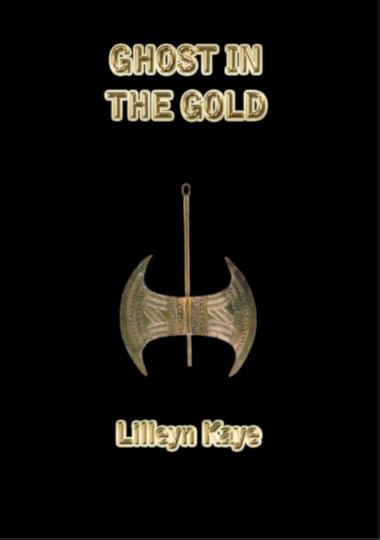 Looking for fantasy, I came across this book via a recommendation, and I’m glad I did. Lilleyn Kaye is a new author to me and I’ll certainly look out for more of her work. In this tale of witchcraft and love, she sends the reader on a journey with plenty of twists and turns.
Looking for fantasy, I came across this book via a recommendation, and I’m glad I did. Lilleyn Kaye is a new author to me and I’ll certainly look out for more of her work. In this tale of witchcraft and love, she sends the reader on a journey with plenty of twists and turns.Those familiar with my reviews will know that I’m very keen on good characters. In Ari, Sira and Dion, this writer gives us well-rounded characters with their flaws and idiosyncrasies; people we can relate to and empathise with. But, in Claudia and Edward, she gives us a pair of the most wicked individuals you could ever wish to find on the page; I can only hope never to meet such evil in real life!
The theme of the book allows for plenty of sex, but this is neither intrusive nor excessive, as it’s an essential component of the story. In particular, the sexual awakening of young woman with no experience is handled well, illustrating the theme of the corruption of innocence without straying into prurience.
The story is well written and paced, taking the reader through events that slowly build into a nightmare experience. The final third of the book is fast-paced and tense, culminating in a denouement that is both inevitable and satisfying. Have your tissues handy.
A fantasy romance with edge, this is a book that will hold your attention and reward your time with a story well told. Fully recommended.

Published on March 03, 2014 00:31
March 2, 2014
Read an Ebook Week: Free Books from Smashwords
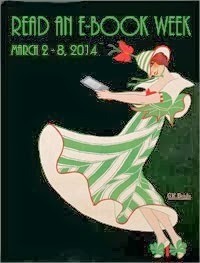 Great news! Smashwords, the company that distributes my ebooks, is taking part in Read an Ebook Week. The period starts from today, 2 March, and goes on through to 8 March.What does it mean? That my books are discounted. In fact, I’ve selected the option to make all my ebooks available at no cost. Yes, that means they’re ALL FREE for this period.Why? Because I want to gain new readers. I would, of course, love it if you’d take the time to write a short review and post it everywhere you can. But there’s no obligation: I promise I won’t send round ‘the boys’ if you don’t write a review. Just enjoy the read, and tell your friends.So, mosey on over to Smashwords and get downloading. Just click on the titles below and apply the coupon code RW100 to get the book(s) free of charge.
Great news! Smashwords, the company that distributes my ebooks, is taking part in Read an Ebook Week. The period starts from today, 2 March, and goes on through to 8 March.What does it mean? That my books are discounted. In fact, I’ve selected the option to make all my ebooks available at no cost. Yes, that means they’re ALL FREE for this period.Why? Because I want to gain new readers. I would, of course, love it if you’d take the time to write a short review and post it everywhere you can. But there’s no obligation: I promise I won’t send round ‘the boys’ if you don’t write a review. Just enjoy the read, and tell your friends.So, mosey on over to Smashwords and get downloading. Just click on the titles below and apply the coupon code RW100 to get the book(s) free of charge.Heir To Death’s Folly.Sensuous Touches.Breaking Faith.Ten Tales For Tomorrow.Ten Love Tales.The Methuselah Strain.But, Baby, It’s Cold Outside: no code needed – this one’s always been free.Or, click here to access all the books on one page.
Hurry! At the end of the week, only the seasonal tale will continue to be free.
If you have any difficulty downloading the book(s) onto your device, click this link for instructions. Related articles
 Read an Ebook Week at Smashwords - my links and codes
Read an Ebook Week at Smashwords - my links and codes
 Ebook week at Smashwords - March 2nd - 8th, 2014
Ebook week at Smashwords - March 2nd - 8th, 2014
 Read An EBook Week March 3-9
Read An EBook Week March 3-9
 Smashwords Announces Author Promo for Read an eBook Week
Smashwords Announces Author Promo for Read an eBook Week
 Read an ebook week this week!
Read an ebook week this week!

Published on March 02, 2014 00:42
March 1, 2014
Two Months In: Where Are We?
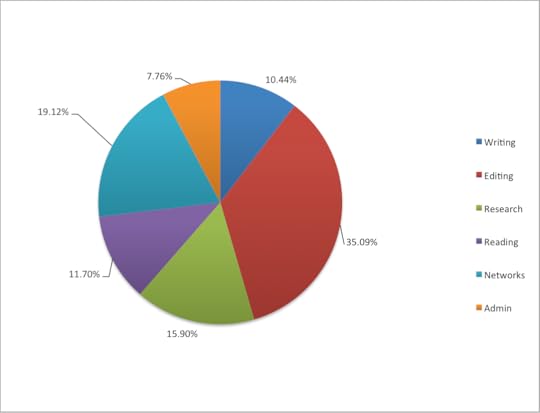 February has been a full and interesting month. I’m fortunate to live in a part of the UK that rarely has heavy rainfall, so no flooding here: the eastern half is much dryer than the west. But we’ve had our share of high winds and a few very wet days. I had to spend an afternoon repairing wind damage to the cladding at the eaves; just grateful it’s a bungalow!
February has been a full and interesting month. I’m fortunate to live in a part of the UK that rarely has heavy rainfall, so no flooding here: the eastern half is much dryer than the west. But we’ve had our share of high winds and a few very wet days. I had to spend an afternoon repairing wind damage to the cladding at the eaves; just grateful it’s a bungalow!My wife was invited to take part in a TV quiz programme, and that took us away for 4 days down south, which made for an interesting interlude. I’d never been to Borehamwood, home of Elstree Studios, before. And, as Sunday was a day off, we took a trip up the road to St Albans; an interesting old town. As always, when I visit new places, I contributed reviews of the various places visited on TripAdvisor, since I use such reviews to make my own selections and think this is a useful service for other visitors. (You'll find my reviews under my real name, Stuart Allison, should you be curious).
Our daughter had a couple of day-long interviews relating to her future studies, so another 2 days out. Only one, in York, resulting in further reviews, since the other didn’t necessitate a stay.
So, what have I managed during this truncated period? 4 books read and reviewed; I’m halfway through a fifth. 7 blog posts written and edited and 5 posted (the other 2 were guest posts on other people’s blogs, one of which hasn’t yet appeared). 2 short stories written and 3 edited. One of these hasturned into a sci-fi novelette, so I’ve done the 8 character sketches for that and made a few notes. A bit of further research and I should start writing it shortly. Had a couple of research sessions to bring the Writing Contests page up to date, and actually entered 4 of the contests myself. And I also contributed a new short piece to Readwave. But, most of the time has been spent editing volume 3 of the fantasy trilogy. For the technical aspects, I’ve been using the very comprehensive online editing suite, ProWritingAid, which I fully recommend. Managed 11 chapters, since the process is a deep edit, requiring some beta reading. Book 1, A Seared Sky: Joinings, is due to be published by Fantastic Books Publishing very soon. But that’s a topic for another post. Watch this space!
Quite a busy spell all in all, and relatively satisfying from a writer’s point of view. How’s it been for you?
The chart, explained: Writing - initial creation of stories, blog posts, reviews and longer works.Editing - polishing of all written work to make it suitable for readers.Research - discovery of info for story content, market research, contests and blog posts.Reading - books and writing magazines.Networking - emails, Twitter, Pinterest, Facebook, LinkedIn, Google+, and comments.
Admin - story submission, blog posting, marketing, organisation, tax, and general admin tasks.Related articles
 Melanie's Stuff on ReadWave This Week
Melanie's Stuff on ReadWave This Week
 #Imagine: Penny Grubb Interviews Author Stuart Aken
#Imagine: Penny Grubb Interviews Author Stuart Aken

Published on March 01, 2014 09:53
February 28, 2014
Making Memes, For Writers
 What is a meme? There’s a great explanation on the inimical Wikipedia here. But, in short, for our purposes, it’s a message conveyed via the medium of a picture with words added.
What is a meme? There’s a great explanation on the inimical Wikipedia here. But, in short, for our purposes, it’s a message conveyed via the medium of a picture with words added.So, what’s it got to do with writers?
Essentially, of course, your book cover constitutes a type of meme. But it’s in the area of promotion that these devices really come into their own. It’s long been the case that visual messages create greater interest and more responses than the written word alone. In the visually biased world we now inhabit, this has become even more the case, and promises to be increasingly so into the foreseeable future.
The idea is that it’s more effective to produce a ‘poster’, with relevant background picture and your words applied, than to simply quote the words in a tweet or short post.
 A lot of writers employ cameras to collect information and records for their writing. It’s a fairly simple matter to use the same equipment to collect images suitable for backgrounds for memes. For those who don’t own or use a camera (and don’t forget most mobile phones now contain a camera, as do tablets) there are a large number of sites where you can use images taken by others. On most of these you can make unlimited use of pictures for a small fee and limited use for free. Don’t be fooled by the many claims that all images are free. Almost without exception, such images are either very small or bear a great big watermark. ‘Free’ for this purpose, generally means they are ‘royalty free’; in other words, once purchased, they can be used commercially. Pricing is from around £2.00 a picture, depending on image size. Make sure you read the licencing agreements before you use them. I’ve made use of some of these images for my book covers and they represent a very worthwhile investment. I list some of the sites at the end of this post.
A lot of writers employ cameras to collect information and records for their writing. It’s a fairly simple matter to use the same equipment to collect images suitable for backgrounds for memes. For those who don’t own or use a camera (and don’t forget most mobile phones now contain a camera, as do tablets) there are a large number of sites where you can use images taken by others. On most of these you can make unlimited use of pictures for a small fee and limited use for free. Don’t be fooled by the many claims that all images are free. Almost without exception, such images are either very small or bear a great big watermark. ‘Free’ for this purpose, generally means they are ‘royalty free’; in other words, once purchased, they can be used commercially. Pricing is from around £2.00 a picture, depending on image size. Make sure you read the licencing agreements before you use them. I’ve made use of some of these images for my book covers and they represent a very worthwhile investment. I list some of the sites at the end of this post.So, how do you apply words to a picture? MS Word allows you to do this in a very basic way. You ‘insert’ a picture in a document and then set the text so that the picture is ‘behind’ the chosen text. However, this is unsatisfactory for a number of reasons; mostly, it’s very limited and not easy to manipulate. Most ‘Painting’ applications will allow the placing of words over or within an image. They also tend to be fairly limited and not particularly straightforward, however.
By far the most effective way of applying text to a picture is to use image manipulation applications,
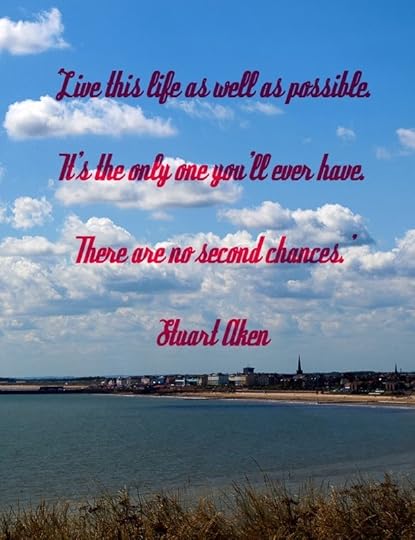 like Photoshop. However, be aware that you need a degree in computer science, the patience of a saint and the intuitive skills of a genius to make full and efficient use of such programs (My daughter is currently studying Photography at university: they don’t teach Photoshop, even though most of their students use the program. Why don’t they teach it? A lecturer, asked the question, stated it would take a full-time course of around 5 years to do it justice!)
like Photoshop. However, be aware that you need a degree in computer science, the patience of a saint and the intuitive skills of a genius to make full and efficient use of such programs (My daughter is currently studying Photography at university: they don’t teach Photoshop, even though most of their students use the program. Why don’t they teach it? A lecturer, asked the question, stated it would take a full-time course of around 5 years to do it justice!)But, don’t despair: you don’t need a complex program to produce your memes. Below are some of the applications offered, free and online, that I’ve tried out for you. In each case, I used my own images, but all these sites have libraries of pictures you can use as part of the application. I used Fotofelexer to produce ‘We Travel this road…’ and ‘Breaking Faith’. Picmonkey was used for ‘If we stop..’ And Ipiccy produced ‘Life is…’These I found easy to use, but each works in slightly different ways, so you’ll need to give them a try to find out which one suits your particular working methods.
The accompanying posters are memes I produced specifically for this post and each took me only a few minutes. Many of the sites have bells and whistles to allow you to ‘jazz-up’ your creations, should you feel so inclined. My advice is to have a go and see what you can come up with.
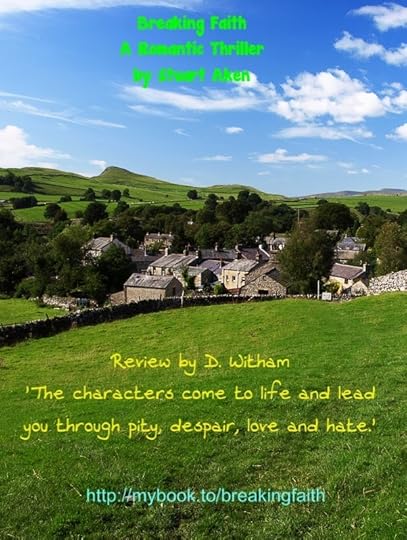 And, what to do with these wonders once you’ve produced them? Well, you can Tweet them on Twitter, add them to your blog/website, make them part of your Pinterest collection and stick them in albums on your Facebook and/or Google+ author page (what do you mean, you haven’t got one?). Obviously, make sure there’s a buying link to those that promote your books. As for the words you use to apply to the pictures, you have a choice of your own pithy sayings, excerpts from the text of the book and, of course, those wonderful words of praise from your reviewers (make sure you credit them, of course).
And, what to do with these wonders once you’ve produced them? Well, you can Tweet them on Twitter, add them to your blog/website, make them part of your Pinterest collection and stick them in albums on your Facebook and/or Google+ author page (what do you mean, you haven’t got one?). Obviously, make sure there’s a buying link to those that promote your books. As for the words you use to apply to the pictures, you have a choice of your own pithy sayings, excerpts from the text of the book and, of course, those wonderful words of praise from your reviewers (make sure you credit them, of course).Have fun and scatter memes all over your world. You never know, you might actually attract some readers and maybe even sell some books!
If you’ve found this useful, stimulating, interesting or experienced any other positive outcome, please use the ‘share’ buttons at the foot of the post to let others know about it. It took me a lot of time and effort to produce this post. Thanks. Oh, and by all means comment, but bear in mind I’m no expert, so I may not be able to answer technical questions!
Photo editing sites: http://pixlr.com/editor/ Too much like Photoshophttp://fotoflexer.com/app/index.php?integration=upload Easy to use and comprehensive http://www134.lunapic.com/editor/ Difficult – can’t copy and paste a block of texthttp://www.picmonkey.com/ More variety available if you upgrade at $4.99/month or $33/yearhttp://ipiccy.com/ Useful and comprehensive.
Sites where you can get pictures:http://www.dreamstime.com/ 21,500,000 images – small charge and some free. I’ve used this for covers.http://www.shutterstock.com/ 30,000,000 images – small charge, some freehttp://www.istockphoto.com/ V large selection – small charge, some freehttp://www.thinkstockphotos.co.uk/ V large selection – small charge – some free.
http://www.freedigitalphotos.net/ Large selection – small charge, some free.
Published on February 28, 2014 02:00
February 23, 2014
The Faber Book of 20th Century Verse, Reviewed
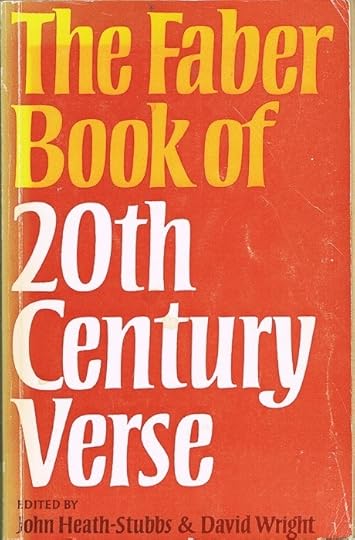 I approached this collection as a reader who rarely looks at poetry, though I did recently enjoy an anthology of Roger McGough’s excellent verse and I’ve always had a deep admiration for Dylan Thomas’ Under Milk Wood. However, as a writer of prose fiction, I’m aware that poetry has a good deal to offer the author. In order to work, it has to condense ideas into few precise words, it employs metaphor and simile to great effect and it frequently ignores the usual rules of narrative prose.
I approached this collection as a reader who rarely looks at poetry, though I did recently enjoy an anthology of Roger McGough’s excellent verse and I’ve always had a deep admiration for Dylan Thomas’ Under Milk Wood. However, as a writer of prose fiction, I’m aware that poetry has a good deal to offer the author. In order to work, it has to condense ideas into few precise words, it employs metaphor and simile to great effect and it frequently ignores the usual rules of narrative prose.This particular anthology, published in 1953 and reprinted in 1978 with significant amendments, purports to embody the poetry of a century to that point. I found it irritating that many poets were represented by excerpts from longer works, these tasters giving an idea of style without any indication of the full import of the work. There was, for me, much that was impenetrable: so many of the poems referenced previous works with which I’m unfamiliar. Because of this, I was unable to enjoy large sections of the offering.
It was interesting to be re-acquainted with one or two poets I’d studied for my school exams: John Betjeman’s Upper Lambourne coming alive again so many years after I dissected it in class for ‘O’ level GCE under the inspiring guidance of a gifted English teacher. And the mawkish sentimentality of Thomas Hardy’s poetry re-appearing from my days of ‘A’ level studies undertaken at night class during a year’s discovery of some otherwise excellent works.
I enjoyed some of the verse from the First World War poets and a few of the other offerings. And I was introduced to such luminaries as Ezra Pound, A.E. Houseman and T.S. Eliot, for which I’m grateful. But I discovered that my poor opinion of James Joyce remained unaltered. And D.H. Lawrence was a better novelist than he was a poet.
All in all, an unsatisfactory collection for me. But I’ll attempt more in the future. I have a couple more anthologies on the shelf and I’m determined to give this form a real chance to impress me. Unfortunately, this particular collection failed to do that job.
Published on February 23, 2014 02:44
February 22, 2014
Short Fiction: The Dilemma of Length.
 English: Atmosphere of Mars taken from low orbit The Galle "smiley" crater can be seen to the left (Photo credit: Wikipedia)Are you plotter or pantster? I’m the latter, whether writing long or short fiction. This morning, with no thought in mind, other than that I wanted to write a science fiction short story, I sat at the keyboard and turned out 1,000 words, set on Mars, before breakfast. It was a little slower than normal, as I needed to search for international names for my characters (I make this easier by using a table I’ve developed over the years. It holds 10,000+ first names from all over the world, colour coded for gender, and noted with countries of usage for the names listed. It’s easy to search for names for a specific nationality by doing a search on that country. You can access a free copy on my blog, here.)
English: Atmosphere of Mars taken from low orbit The Galle "smiley" crater can be seen to the left (Photo credit: Wikipedia)Are you plotter or pantster? I’m the latter, whether writing long or short fiction. This morning, with no thought in mind, other than that I wanted to write a science fiction short story, I sat at the keyboard and turned out 1,000 words, set on Mars, before breakfast. It was a little slower than normal, as I needed to search for international names for my characters (I make this easier by using a table I’ve developed over the years. It holds 10,000+ first names from all over the world, colour coded for gender, and noted with countries of usage for the names listed. It’s easy to search for names for a specific nationality by doing a search on that country. You can access a free copy on my blog, here.)Later this morning, my wife and I took a longish walk in the local countryside: we enjoy regular fresh air and exercise for mental as well as physical wellbeing). This sort of gentle activity is an excellent opportunity for rumination. I carry a voice recorder to catch those ideas that pop to the surface as we walk, often in companionable silence.
The story I’d started was jostling with the natural landscape for attention. And, as so often happens when relaxed, a sudden idea struck me. The story is more suited to a greater length than the short story I’d envisaged. It’s an obvious candidate for a novelette; I guess at around 30-40,000 words. Now, because of the way I write, this isn’t a problem for me. I’ll have to re-write the beginning, since I no longer have to introduce 8 characters in such a short space, but that’s all to the good. It was the character numbers, an essential element of the story, that had caused me to pause in the writing. The solution was simple. Write a longer story.
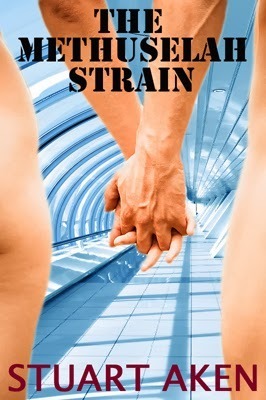 And the purpose of this piece? Simply to illustrate that you don’t have to fence yourself in with story length if an idea isn’t working as expected. Examine it at leisure and decide whether it’s simply the chosen length that’s forming a barrier to creativity. My other sci-fi novelette, The Methuselah Strain, started out as a short story but it soon became clear I needed more space to examine the themes and develop the characters. So, don’t let word numbers confine you. Instead, allow the story to find its natural length and then find the suitable market for it. The current sci-fi novelette I’m developing will become a self-published ebook initially instead of the magazine-bound short story I’d started. Be flexible. It works. And the magazine story I’d intended? No matter: I’ll write another when the idea strikes.
And the purpose of this piece? Simply to illustrate that you don’t have to fence yourself in with story length if an idea isn’t working as expected. Examine it at leisure and decide whether it’s simply the chosen length that’s forming a barrier to creativity. My other sci-fi novelette, The Methuselah Strain, started out as a short story but it soon became clear I needed more space to examine the themes and develop the characters. So, don’t let word numbers confine you. Instead, allow the story to find its natural length and then find the suitable market for it. The current sci-fi novelette I’m developing will become a self-published ebook initially instead of the magazine-bound short story I’d started. Be flexible. It works. And the magazine story I’d intended? No matter: I’ll write another when the idea strikes.

Published on February 22, 2014 07:10
February 15, 2014
Wake Up and Live, by Dorothea Brande, Reviewed
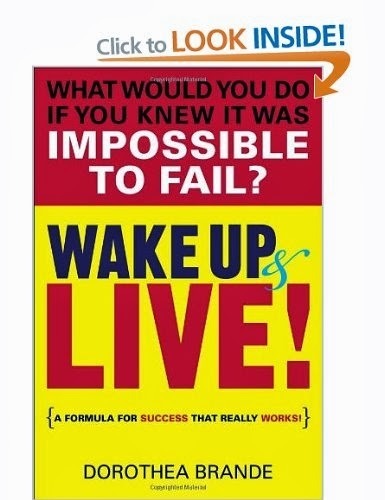 I came to this remarkable piece of work via an offer from another author who’d ‘rewritten’ it. When I saw the original was by Dorothea Brande, I looked for that original. After all, why have a copy? This was especially the case as I’d always admired her other brilliant work, ‘Becoming a Writer’.
I came to this remarkable piece of work via an offer from another author who’d ‘rewritten’ it. When I saw the original was by Dorothea Brande, I looked for that original. After all, why have a copy? This was especially the case as I’d always admired her other brilliant work, ‘Becoming a Writer’.This is a ‘self-help’ book; a variety of nonfiction I rarely bother with, especially since reading the over-egged ‘The Secret’. But, knowing Brande’s previous work, I decided to give this a chance. And I’m glad I did.
In common with a great many people, I’ve had the suspicion for some time that something in my approach to life was letting me down. Brande’s perceptive narrative and observations make a great deal of sense. It’s true that many of us, without being conscious of the fact, spend a good deal of time and energy willing ourselves to fail. We do this even as we kid ourselves that everything we do is designed to make us succeed.
As with her other book, the author sets exercises so that this is more a short ‘course’ than a text book. I’ve only just finished reading it, so haven’t yet had time to apply these. However, having read the text, I can see the validity and purpose behind them and will be performing these exercises over the next weeks.
The one thing I’ve already taken from the book, which I can apply at once, is her advice to ‘act as though you cannot fail’. As a bald statement, this lacks the power it generates within the text. In a nutshell, it’s a plea to the reader to be courageous, to act with purpose and deep consideration in all areas of life that matter to you. There is much, much more, of course. But, if you’re one of those people for whom life has been disappointing, for whom life hasn’t come up to expectations, I recommend you read this book. This original version is also cheaper than the copy I was offered, by the way.

Published on February 15, 2014 09:09
February 11, 2014
Guest Blogging Today
Just to let you know I've a guest post on the great blog run by Joanne Troppello - Here's the link
If you visit, you may find out things you never knew!
Guest posting is time-consuming but a great way to spread the word. Enjoy.
Related articles Guest Post - Inspirational Avenues by Cp Bialois
Guest Post - Inspirational Avenues by Cp Bialois
 > A GUEST POST: On Farage's Party's Betrayal of British Voters
> A GUEST POST: On Farage's Party's Betrayal of British Voters
 I've been guest blogging
I've been guest blogging

If you visit, you may find out things you never knew!
Guest posting is time-consuming but a great way to spread the word. Enjoy.
Related articles
 Guest Post - Inspirational Avenues by Cp Bialois
Guest Post - Inspirational Avenues by Cp Bialois
 > A GUEST POST: On Farage's Party's Betrayal of British Voters
> A GUEST POST: On Farage's Party's Betrayal of British Voters
 I've been guest blogging
I've been guest blogging

Published on February 11, 2014 00:51
February 9, 2014
The Third Twin, by Dani Sinclair, Reviewed
This is a Mills and Boon Silhouette, ‘Intrigue’ romance. That probably means a lot to those who read these books regularly. As a writer, and a bloke, I read this one to see whether it was a genre I could write. So, bear all that in mind as you read this review.
It is, of course, a love story. But it’s also a lot more. The element of crime is strong, as are the elements of family and social injustice. A lot of readers condemn these books out of hand, assuming they’re poorly written and formulaic. I found this to be neither of those things.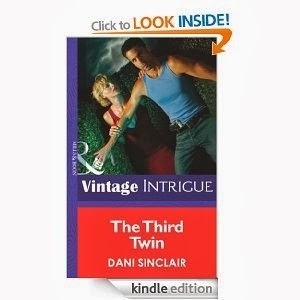
There is suspense, mystery, tension, both sexual and general, and there is, of course, a burgeoning romance. It’s this final element that’s formulaic. The reader understands that the two main protagonists are destined for each other and recognises the barriers placed for them to cross in order to arrive at the essential happy ending (no, I don’t think that’s a spoiler: a romance of this nature has a happy ending; they all do).
As for the writing? It’s tense where it should be, description isn’t overdone, the action scenes are well handled and the relationships, complex and multi-faceted, are presented cleverly. I found the plot a little over-cooked and the author seemed to have found herself in something of a maze, if the denouement narrative is a guide. The ending reminded me a bit of Agatha Christie’s Poirot and his habit of describing his method of detection to the gathered guilty and innocent.
For me, character is the most important factor in a book. The individuals who people these pages are well drawn and various. That they can be slotted into various stereotypes is inevitable, given the narrow guidelines determined by the publishers, but that doesn’t prevent these particular players from being real people. I enjoyed the strong female lead and the object of her desire fitted in well with her hopes with enough potential flaws to make the reader wonder just enough. The minor players were also well constructed.
There is inevitably, given the specifics set by the publishers, rather more telling than showing than is good for the book. And some of the twists and turns seem to have been inserted ‘on the hoof’ rather than planned; but I can hardly complain at that, since I do it all the time myself.
But, in spite of its intended female readership and the slant it must take for such an audience, I enjoyed the read and found it largely satisfying. For those who care, there remains an unanswered question, of course. The answer is that I have already written a book containing much of what we find here, but I couldn’t write for this specific genre. It’s too confined and controlled for the way I write. But that’s not a reflection of the ability of this author; she’s worked within the constraints admirably and turned out a pretty good read that, I imagine, will sit very happily with those who more regularly read this type of fiction.
So, if you enjoy your romance with intrigue, mystery and some threat facing the heroine, you’ll get good value and plenty of entertainment from this one. Give it a go.Related articles BOOK REVIEW - THE BALLERINA & THE FIGHTER by Ursula Sinclair
BOOK REVIEW - THE BALLERINA & THE FIGHTER by Ursula Sinclair

It is, of course, a love story. But it’s also a lot more. The element of crime is strong, as are the elements of family and social injustice. A lot of readers condemn these books out of hand, assuming they’re poorly written and formulaic. I found this to be neither of those things.

There is suspense, mystery, tension, both sexual and general, and there is, of course, a burgeoning romance. It’s this final element that’s formulaic. The reader understands that the two main protagonists are destined for each other and recognises the barriers placed for them to cross in order to arrive at the essential happy ending (no, I don’t think that’s a spoiler: a romance of this nature has a happy ending; they all do).
As for the writing? It’s tense where it should be, description isn’t overdone, the action scenes are well handled and the relationships, complex and multi-faceted, are presented cleverly. I found the plot a little over-cooked and the author seemed to have found herself in something of a maze, if the denouement narrative is a guide. The ending reminded me a bit of Agatha Christie’s Poirot and his habit of describing his method of detection to the gathered guilty and innocent.
For me, character is the most important factor in a book. The individuals who people these pages are well drawn and various. That they can be slotted into various stereotypes is inevitable, given the narrow guidelines determined by the publishers, but that doesn’t prevent these particular players from being real people. I enjoyed the strong female lead and the object of her desire fitted in well with her hopes with enough potential flaws to make the reader wonder just enough. The minor players were also well constructed.
There is inevitably, given the specifics set by the publishers, rather more telling than showing than is good for the book. And some of the twists and turns seem to have been inserted ‘on the hoof’ rather than planned; but I can hardly complain at that, since I do it all the time myself.
But, in spite of its intended female readership and the slant it must take for such an audience, I enjoyed the read and found it largely satisfying. For those who care, there remains an unanswered question, of course. The answer is that I have already written a book containing much of what we find here, but I couldn’t write for this specific genre. It’s too confined and controlled for the way I write. But that’s not a reflection of the ability of this author; she’s worked within the constraints admirably and turned out a pretty good read that, I imagine, will sit very happily with those who more regularly read this type of fiction.
So, if you enjoy your romance with intrigue, mystery and some threat facing the heroine, you’ll get good value and plenty of entertainment from this one. Give it a go.Related articles
 BOOK REVIEW - THE BALLERINA & THE FIGHTER by Ursula Sinclair
BOOK REVIEW - THE BALLERINA & THE FIGHTER by Ursula Sinclair

Published on February 09, 2014 03:53
February 7, 2014
Writing the Blurb
It’s possible some of you won’t know what the ‘blurb’ is, so let’s define it.Technically, it’s the selection of words you use to appear on the back of the book with the intention of persuading the reading public to commit to it. With nonfiction, this may be any one of a number of things. But I’m a fiction writer and that’s what I’m discussing here.
Ask yourself a simple question: What do I want my blurb to achieve?The answer should be that it hooks the reader to the extent that he/she makes a decision to purchase (or borrow) the book.
How do you do that?Consider the usual circumstances: that potential reader is in a library (which is a less challenging place for many reasons) or, hopefully, in a bookshop. What’s going on in there? Other people, possibly background music, staff hovering, ready to pounce on the promise of a sale, but, most importantly, there are books. Shelves and shelves of books. Books in competition with yours for the customer’s money and attention. Some of them have the dubious advantage of celebrity status (though why the name of a celebrity should sell a novel is a mystery to me: most of them seem vacuous and uninteresting). Some will be by authors already accepted as both entertaining and absorbing. Some will be part of a special deal, offering 3 for the price of 2 or half price deals. So, not only do you have to compete with all these external influences, but you have a limited amount of time to do so.
The purpose of the blurb is to sell your book. You don’t want a synopsis (save that for the agent and/or publisher who need to have more detail to determine the genre and potential market for your book). What you do need is a pithy, short piece of description that will intrigue, fascinate, tempt and impress the reader. Length will be determined either by the publisher (in which case, the blurb may well be written by a staff member anyway), or, more likely, by a combination of genre and design. You may, for example, have excerpts of quotes displayed on the back cover.
So, what can you say in 50 to 150 words that will clutch at the reader’s imagination and make him/her want to explore the interior, flick through the pages, and perhaps, just perhaps, part with ready cash? Use of strong verbs, avoidance of adverbs, and language that says precisely what it’s meant to convey are essential.
A question often works; citing the major dilemma in the book and suggesting some sort of possible conflict/danger/ambition achieved (depending on the genre). ‘Will Susan’s obsession with chocolate stop her turning the rivalry between her and siren sister, Ophelia, to her advantage when it comes to attracting ruggedly handsome Martin?’ (superficial romantic fiction)
A hint of the challenges facing the protagonist(s) will often act as a hook: ‘When James opens an envelope surreptitiously placed on the passenger seat of his locked Bentley, he begins a journey that will ultimately threaten not only his business but the reputations and lives of those he most loves.’ (thriller)
I was recently asked by Fantastic Books Publishing to provide a blurb for the first volume of my fantasy trilogy, which they’re publishing in spring. 50 words in 3 sentences was the brief. Here are a couple of examples:
‘Hatred between a corrupt leader and the rightful heir flares when a crucial prophesy is misread.Regardless of cost, a fanatical disciple feels compelled to right a decisive wrong in a key ritual.Against overwhelming odds, a young hunter sets out to rescue his adored betrothed.’
And
‘A false prophesy forces a corrupt leader to menace the rightful heir and start a dangerous mission.Only the reckless kidnap of the leader’s daughter by a fanatical disciple might correct a vital wrong.A charismatic young hunter braves hostile seas and unknown lands to free the gifted maiden he loves.’
I’ve no idea whether either of these will be used. But, for me, they illustrated the difficulty of encapsulating the essence of a story running at 200k+ words, with 3 intertwining stories, into so few words. Not, as I say, a synopsis, but a flavour, a taster, a teaser that will encourage readers to read on.
Do they hint enough at potential challenges and conflicts? Do they insert questions into the mind of the reader? Do they, most importantly, encourage the reader to open the book?
I’d love your observations and comments.Related articles How to Write a Brilliant Blurb for Your Book
How to Write a Brilliant Blurb for Your Book
 Blurbs
Blurbs

Ask yourself a simple question: What do I want my blurb to achieve?The answer should be that it hooks the reader to the extent that he/she makes a decision to purchase (or borrow) the book.
How do you do that?Consider the usual circumstances: that potential reader is in a library (which is a less challenging place for many reasons) or, hopefully, in a bookshop. What’s going on in there? Other people, possibly background music, staff hovering, ready to pounce on the promise of a sale, but, most importantly, there are books. Shelves and shelves of books. Books in competition with yours for the customer’s money and attention. Some of them have the dubious advantage of celebrity status (though why the name of a celebrity should sell a novel is a mystery to me: most of them seem vacuous and uninteresting). Some will be by authors already accepted as both entertaining and absorbing. Some will be part of a special deal, offering 3 for the price of 2 or half price deals. So, not only do you have to compete with all these external influences, but you have a limited amount of time to do so.
The purpose of the blurb is to sell your book. You don’t want a synopsis (save that for the agent and/or publisher who need to have more detail to determine the genre and potential market for your book). What you do need is a pithy, short piece of description that will intrigue, fascinate, tempt and impress the reader. Length will be determined either by the publisher (in which case, the blurb may well be written by a staff member anyway), or, more likely, by a combination of genre and design. You may, for example, have excerpts of quotes displayed on the back cover.
So, what can you say in 50 to 150 words that will clutch at the reader’s imagination and make him/her want to explore the interior, flick through the pages, and perhaps, just perhaps, part with ready cash? Use of strong verbs, avoidance of adverbs, and language that says precisely what it’s meant to convey are essential.
A question often works; citing the major dilemma in the book and suggesting some sort of possible conflict/danger/ambition achieved (depending on the genre). ‘Will Susan’s obsession with chocolate stop her turning the rivalry between her and siren sister, Ophelia, to her advantage when it comes to attracting ruggedly handsome Martin?’ (superficial romantic fiction)
A hint of the challenges facing the protagonist(s) will often act as a hook: ‘When James opens an envelope surreptitiously placed on the passenger seat of his locked Bentley, he begins a journey that will ultimately threaten not only his business but the reputations and lives of those he most loves.’ (thriller)
I was recently asked by Fantastic Books Publishing to provide a blurb for the first volume of my fantasy trilogy, which they’re publishing in spring. 50 words in 3 sentences was the brief. Here are a couple of examples:
‘Hatred between a corrupt leader and the rightful heir flares when a crucial prophesy is misread.Regardless of cost, a fanatical disciple feels compelled to right a decisive wrong in a key ritual.Against overwhelming odds, a young hunter sets out to rescue his adored betrothed.’
And
‘A false prophesy forces a corrupt leader to menace the rightful heir and start a dangerous mission.Only the reckless kidnap of the leader’s daughter by a fanatical disciple might correct a vital wrong.A charismatic young hunter braves hostile seas and unknown lands to free the gifted maiden he loves.’
I’ve no idea whether either of these will be used. But, for me, they illustrated the difficulty of encapsulating the essence of a story running at 200k+ words, with 3 intertwining stories, into so few words. Not, as I say, a synopsis, but a flavour, a taster, a teaser that will encourage readers to read on.
Do they hint enough at potential challenges and conflicts? Do they insert questions into the mind of the reader? Do they, most importantly, encourage the reader to open the book?
I’d love your observations and comments.Related articles
 How to Write a Brilliant Blurb for Your Book
How to Write a Brilliant Blurb for Your Book
 Blurbs
Blurbs

Published on February 07, 2014 06:22



